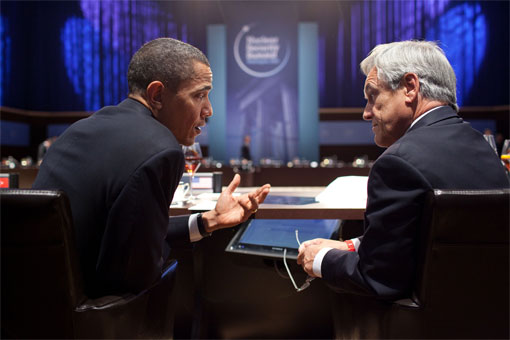Amidst nuclear meltdown in Japan, growing pressures to respond to the carnage in Libya and the specter of a possible U.S. government shutdown, flitting rumors have circulated that the visit of President Barack Obama to three Latin American countries may be cancelled or postponed. This would be a major setback in U.S. relations with the Western Hemisphere, signaling once again that Latin America is at or near the bottom of U.S. foreign policy priorities.
The President’s trip, indeed, comes at a crossroads for U.S. relations with the hemisphere. Never in history have the countries of South America reached so broadly beyond the hemisphere for commercial and political partners. And never has the divide between North and South America—from countries on the U.S. periphery (including Mexico and Central America) and those further away—been more acute. Obama’s visit to Brazil, Chile and El Salvador reflects the diverse challenges and opportunities for constructing a positive relationship amid the hemisphere’s asymmetries.
Economics, Trade and Public Opinion
In many ways, the United States has already fallen behind in the region. Trade partners and trade patterns are rapidly changing. The United States remains by far Latin America’s largest trading partner, with trade totaling just over $500 billion last year. But once Mexico is factored out of the equation, the U.S. role is more limited. Asia—primarily but not exclusively China—is Latin America’s second largest partner, overtaking the European Union. China has now surpassed the United States as the top export destination for Brazil, Chile and Peru.
South American economies are also on much stronger footing than that of the United States, growing at a rate of 5 to 6 percent—double that of the U.S.—between 2004 and 2008. China in particular has boosted demand for the region’s energy, agricultural products and other commodities. And the U.S.-Latin America growth gap has only widened since the onset of the recession. According to Brazil’s Institute for Geography and Statistics (IBGE), the country’s economy grew by 7.5 percent in 2010, displacing France and the United Kingdom as the world’s fifth largest economy. Chile’s GDP growth in January 2011 was 6.8 percent higher than a year ago, while the U.S. economy struggled to top 2 percent.
In both Brazil and Chile, reserves accumulated during boom years allowed the governments to enact countercyclical policies to cushion the impact of the global recession. Latin American countries pride themselves on having been “last in, first out,” of the economic downturn.
The exceptions to that economic dynamism, of course, are those economies most deeply integrated with and dependent on the U.S. market: Mexico, Central America, and the Caribbean. According to the United Nations Development Program (UNDP), after Mexico no country suffered the effects of the U.S. downturn more acutely than El Salvador—the last stop on the President’s trip.
Its economy contracted by 3.5 percent in 2009 according to IMF figures; exports fell by 18 percent according to the USTR, and for the first time in 20 years, remittances—which constitute some 17 percent of GDP and subsidize consumption for millions of poor families—declined precipitously. The Salvadoran economy began to turn around in 2010, but only anemically. A major challenge for El Salvador is that 48 percent of the population lives in poverty, which is a major driver of emigration to the United States. Some 2.5 million Salvadorans—approximately one-third of the country’s entire population—have entered the U.S. with many doing so without authorization.
Even if El Salvador lags in terms of overall economic performance and indicators, the three countries on Obama’s itinerary share a set of common principles: a commitment to democratic practices, macroeconomic stability and free markets, coupled with the belief that the state has an important role to play in advancing social welfare. The Brazilian and Chilean transitions from authoritarianism are only slightly more longstanding than El Salvador’s emergence from civil war. Salvadoran President Mauricio Funes, married to a Brazilian, has looked to Brazil for inspiration and partnerships, and not to the ALBA countries. And at a time when political polarization and partisan acrimony in the United States is deeper than ever, the center-left governments of Brazil and El Salvador and the center-right government of Chile demonstrate the degree to which most Latin American countries have identified with this common core agenda.
Citizens in Brazil, Chile and El Salvador (in that order) lead the region in polls that reflect optimism about the future. According to a 2010 study by Santiago-based Latinobarómetro, 75 percent of Brazilians, 65 percent of Chileans and 63 percent of Salvadorans believed that their country was headed in the right direction; Argentina, by contrast, was ranked the lowest at 19 percent. The Latin American Opinion Project’s AmericasBarometer has demonstrated that satisfaction with democracy in El Salvador jumped over 10 points following the election of Mauricio Funes; positive assessments of the government’s economic performance increased by an even greater margin. All three countries view the United States favorably, although Brazil lags somewhat in this regard. According to the Latinobarómetro study, 89 percent of Salvadorans have a favorable image of the United States, the second-highest level in the region after the Dominican Republic. Chile leads South America in terms of favorable assessments of the United States at 80 percent against a regional average of 74 percent. And these polling numbers for Chile were taken even before two Pennsylvania companies played a prominent role in the rescue of Chilean miners in 2010.
Similarities aside, the three countries also demonstrates the degree to which there is no longer is—if there ever was—a “one size fits all” approach to the Western Hemisphere.
Reset in Brazil, Consolidation in Chile
Brazil is by far the dominant power in the region, accounting for 40 percent of the GDP of all of Latin America and the Caribbean. Brazil’s state-controlled oil company Petrobras is the world’s fourth largest corporation (trailing only ExxonMobil, Apple, and PetroChina). A world pioneer on issues of biofuels, alternative energy and innovation, Brazil is claiming a role on the world stage as never before in its history. As noted by U.S. Ambassador to Brazil Tom Shannon last year, Brazil and the United States have begun “encountering each other in places where traditionally we have not.” The frictions generated by President Lula’s foray last year into the arena of international diplomacy around Iran’s nuclear program appear to have subsided, and the new government of Dilma Rousseff appears positively disposed to a more pragmatic and less conflictive engagement with Washington.
Chile, with the region’s fifth-largest economy, does not wield Brazil’s clout on the regional or global stage, but since the transition from the Pinochet dictatorship in 1990 it has been a poster child for political moderation, democratic consolidation and good governance. During the years of the Concertación, and particularly under Presidents Ricardo Lagos and Michelle Bachelet, no country in the hemisphere did more than Chile to reduce poverty, from over 41 percent of the population in 1989 to 18.2 percent in 2009. The Piñera government has expanded social policies initiated by its predecessors, proposing additional subsidies through Chile Solidario (the flagship social program) and establishing a new Ministry of Social Development. Chile prides itself on its membership in the Asia-Pacific Economic Cooperation (APEC), which links Latin American and Asian countries on the Pacific Rim—together representing half of the global economy and trade. Following the implementation of a U.S.-Chile free-trade agreement (FTA) in 2004, bilateral trade rose over 200 percent; in the meantime, Chile has signed 59 FTAs across the world, reflecting a concerted strategy of diversified international insertion.
Security Focus in El Salvador
If the Obama visit to Brazil and Chile is aimed to recognize the degree to which political and economic advances in the region over the last decade constitute a strategic asset for the United States, the stop in El Salvador reflects more urgent security concerns. The country has one of the highest homicide rates in the world, particularly of young men ages 15-34, and the UNDP estimates that violence—particularly that associated with youth gangs—costs El Salvador roughly 11.5 percent of GDP annually, double the amount of domestic spending on education and health. Organized crime is expanding in El Salvador, in part as result of pressure on Mexican drug trafficking cartels, but also due to explicit efforts by criminal groups to expand their operations to areas close to drug markets in the United States.
The United States already has strong levels of security cooperation with El Salvador; the U.S. base at Comalapa, known as a Forward Operating Location, serves as the main airbase for U.S. counternarcotics operations in the region. And the International Law Enforcement Academy (ILEA) outside San Salvador has graduated tens of thousands of police and judicial officials from dozens of countries within and outside of Latin America. The Obama administration has proposed hundreds of millions of dollars this year for a Central America-wide regional security initiative known as CARSI, of which El Salvador would be a major beneficiary.
The Funes administration has welcomed additional U.S. assistance to combat criminal violence, but has insisted that overcoming the country’s huge social deficits and reducing poverty should be the core of any U.S. aid program to address El Salvador’s enormous security challenges. As in other instances when U.S. security concerns drive the foreign policy agenda in the region, there is a danger that U.S. and Salvadoran priorities will diverge over the relative emphasis given to social versus law enforcement solutions.
If President Obama’s trip takes place, it will be an important demonstration of a changing perception in Washington: that the region’s flourishing democracies and stable economies constitute successes to be welcomed, rather than threats to U.S. interests.
Political and economic engagement with Latin America’s successful democracies—in Obama’s words at the 2009 Summit of the Americas, cementing “twenty-first century partnerships”—would constitute a positive agenda for the region, loosened of the paternalism of the past or the impulse to get involved when security interests are perceived as threatened.
Ultimately, the trip is unlikely to yield major departures on substance. Many concrete initiatives of importance to the region—reducing U.S. agricultural subsidies and ethanol tariffs; reforming immigration laws; approving pending FTAs with Colombia and Panama; and curbing the massive flow of weapons from the United States to criminal groups in the region—remain hostage to political gridlock in the U.S. Congress. That said, the importance of recognizing that political and economic advances in the region over the last decade constitute a strategic asset for the United States should not be underestimated. And in a region mostly ignored except for times of crisis, that acknowledgment marks a major step forward.







